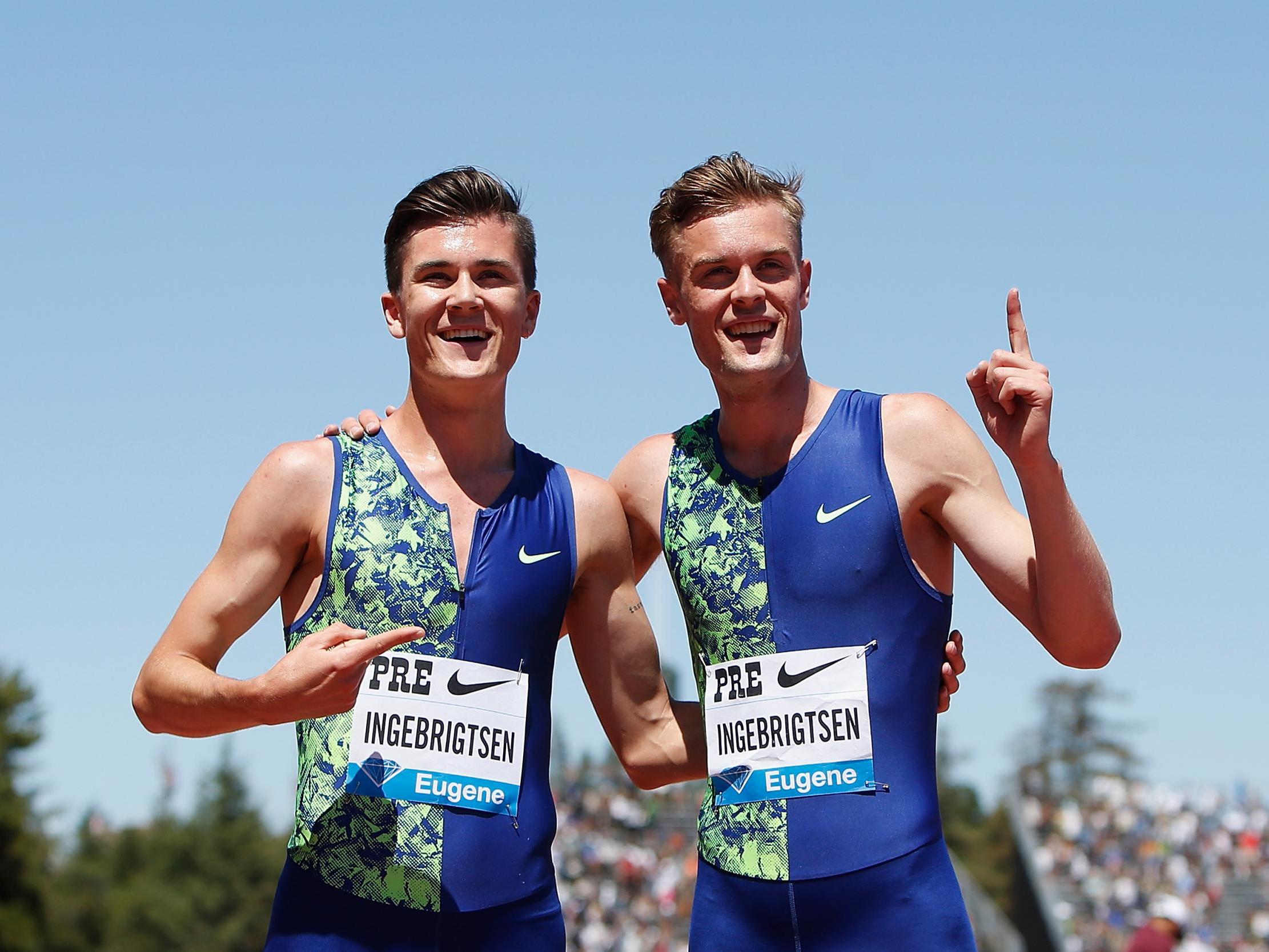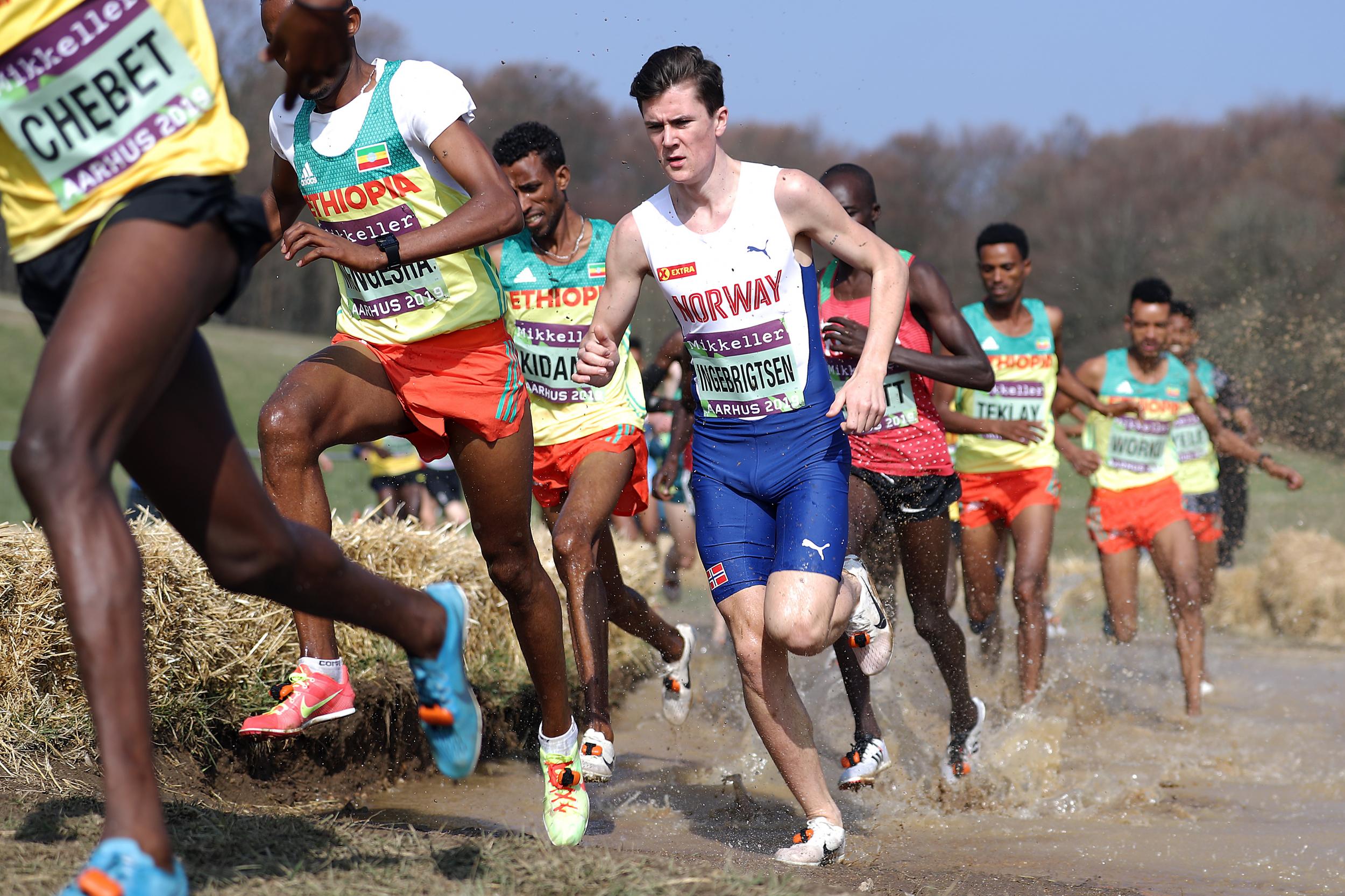‘Machine’ team Ingebrigtsen: How goals, post-race sprints and warm milk drove brothers to cusp of greatness
Brothers Jakob, Henrik and Filip will compete for 5000m gold at the World Athletics Championships in Doha next week under the strict regime of father Gjert

The precocious middle-distance runner Jakob Ingebrigtsen approaches this month’s World Athletics Championships knowing he is the worst-kept secret in the competition. Until last year nobody had achieved the 1500m and 5000m double in the 84-year history of the European Championship. The steely-eyed Norwegian went on to deliver the unprecedented, aged just 17. A year earlier he had become the youngest athlete to ever break the four-minute mile.
Gjert Arne Ingebrigtsen, Jakob’s father and coach, has already published a book entitled “How to raise a world champion”. The release feels premature, but brothers Fillip and Henrik also have designs on taking the title once monopolised by Sir Mo Farah on the pink track of Qatar’s Khalifa International Stadium.
The feats this unique family have already achieved – each are already European gold medallists – brings a human fascination that will peak in Doha. “How to raise a world champion” offers reflections on fatherhood as much as coaching. Gjert Arne had no template for either, raised by a single mother in a small village on the northernmost tip of Scandinavia.
Norway may have topped the medals table at the Winter Olympics last year but it was Gjert Arne who was recognised as the ‘coach of 2018’ in his homeland, for pursuing something novel in a sport in which the country has little heritage. “Usually we would be cross-country skiers,” the 53-year-old tells The Independent. “Henrik and Filip did cross-country skiing but it was too easy. Henrik became Norwegian champion twice, so we chose running [instead] because it was more difficult.”
Filip, who won a bronze medal in the 1500m at the London 2012 Olympics, remembers things slightly differently. “We were seven siblings and you need a lot of equipment to do well in winter sports. Running was more practical: our parents just needed to buy us some shoes and we could go to training. Our dad is pretty strict and he gives us lots of training.
“Also nobody really did anything good in the summer Olympics so we wanted to do something unorthodox and go our own way.”
Vebjørn Rodal was the last athlete to win a global title on the track for Norway, taking the 800m title at the Atlanta Olympics in 1996. Rodal has watched the ascent of ‘Team Ingebrigtsen’ and believes intensive endurance training, unconventionally held within hours of major finals, is what sets them apart.
“It’s about what they do after competitions in the recovery phase, after competitions: they always do recovery running with speed and intensity. Most runners don’t do that,” he says. ”They have a theory that a tougher kind of recovery running is good after competition and they do it the same day as the race.”
Rodal points to the unique high-intensity “restitution” running he witnessed during the Diamond League circuit this season. The brothers would race, fulfil their media duties across what can last up to two hours, before then “completing interval sessions again: 10 x 300m at high speed. When Jakob and Filip were running in Lausanne they finished their session at 1am because they have their regime after competition.”

As was the case in Switzerland, Doha’s 5K final will start at around 9pm local time, meaning post-race sprint sessions, rather than Champagne flutes, as the clock strikes midnight. When Jakob secured the first leg of his European Championship double in Berlin his father advised him to mark the occasion with a warm glass of milk.
Henrik, the eldest brother, will be spared the training session after the 5K final at the race marks the end of his season, but Jakob and Filip have a semi-final in their favoured 1500m later in the week.
Rodal says the regime is unique but that “more and more runners” may look to emulate Team Ingebrigtsen. “Their talent is not the biomechanical part of it. They do not move especially well. They are very well prepared by training, that’s what they do better than the rest.”
Filip dreads the post-race sessions but sees the value in them. “If you have a hard racing programme then there’s not that many days to put mileage in, so race days are a nice day too to do some work. It helps with endurance.”
TeamGB’s Jake Wightman won bronze behind Jakob over 1500m in Germany and will take on the same distance in Qatar. The Nottinghamshire runner won’t contemplate doubling up at a world championships until he achieves his first medal at a global level and admits to being unable to relate to the notion of doing sprint training after a world championship final.
“It helps flush the system out a little bit and gets another little bit of training stimulus but for me, racing is hard enough, so I just take the race as the big peak of the day," says Wightman. "I don’t want to have to think about doing a session after I race.
“I think the fact that they can all race together and almost help each other through races is their biggest strength. But each of them have got two of the best training partners in the world and they’ve got a dad that completely understands them and from what I know from being coached by my dad, it’s always a good thing if you’ve got that.
“Their setup is amazing and the way they race is just perfect every time, so I think they’re definitely going to be able to take it to the Kenyans.”
Henrik has been hampered by injury in recent years but his siblings are both confident of glory. Filip says that at 26-years-old he is at the “peak age for a European athlete”. Jakob, for his part, considers the mid-twenties “old” for a modern middle-distance runner, arguing there should be no reason why European athletes cannot peak at the same age as counterparts from East Africa.
“Jakob has followed his older brothers [on training runs] since he was about seven or eight years old,” Rodal adds. “It’s not training like we’re used to in Norway: long distances, a lot of training for their age. That’s also what they do in Kenya and Ethiopia and you see a lot of 18-year-old boys and girls from those countries performing very well. I think it’s possible for young people to absorb a lot of training and aside of that he’s also very talented. The whole family has high haemoglobin values and they have physical [attributes] for long distance running.”

“The father has perhaps learned what works from Henrik trying and ‘failing’. I always think that Filip is maybe the most talented but Jakob has a stronger mentality. I used to think that Jakob might be too big, too tall, too heavy to run very good [times] but he does not seem to be afraid of anything. He’s a machine. Two years ago in the national championship he ran the 800, 1500, 5K, and the steeplechase, all in three days.”
The title of Gjert Arne’s book shows the ambitions he holds for his children has no limits, though his dual role appears to sometimes leave him conflicted over whether to play expectations up or down. “We have a long-term plan do as best as we can, to be among the best in the world in the long term,” he says. Asked to define the ‘end’ of the long term plan, he says “seeing all three boys in a global final”, which is exactly what will happen in Doha. “We are doing this for fun,” he insists.
Jakob appears unfazed by what is expected of him. “I never dreamt of a gold medal,” he tells The Independent. “It’s my goal to take a gold medal. I think that’s a big difference. I don’t dream, I set goals and I work hard to reach those goals. My goal is not to have Filip and Henrik in the final. My goal is to be in the final myself and after that I think it’s going to be really exciting.”
Join our commenting forum
Join thought-provoking conversations, follow other Independent readers and see their replies
Comments
Bookmark popover
Removed from bookmarks